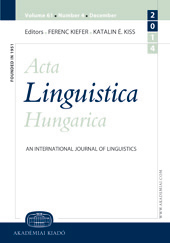Conditions on conditional mood
Conditions on conditional mood
Author(s): Huba BartosSubject(s): Morphology, Syntax
Published by: Akadémiai Kiadó
Keywords: mood; tense; counterfactuality; modality; scope;
Summary/Abstract: This paper argues that conditional mood morphology in Hungarian is the spellout of a morphosyntactic feature excl(w), the semantic interpretation of which is modal exclusion, i.e., counterfactuality. In certain cases (such as wishes, or CF conditionals) this feature is lexically specified on M[ood], with the direct interpretive aim of counterfactuality, while in others M has this feature unvalued, and inherits its value from the category Mod[ality] in a standard AGREE relation. The strong interrelation between M and Mod also manifests in scope phenomena earlier analysed as scope inversion between Mod and T[ense], but can now be accounted for in a more principled way. Finally, it is shown that, unlike what is found in many other languages, Hungarian cannot use tense marking as the exponent of excl(w), because its "tense" is relative, rather than deictic. Therefore, this language makes use of mood morphology to encode CF, in the particular form of conditional mood.
Journal: Acta Linguistica Hungarica (Since 2017 Acta Linguistica Academica)
- Issue Year: 53/2006
- Issue No: 3
- Page Range: 227-248
- Page Count: 22
- Language: English

